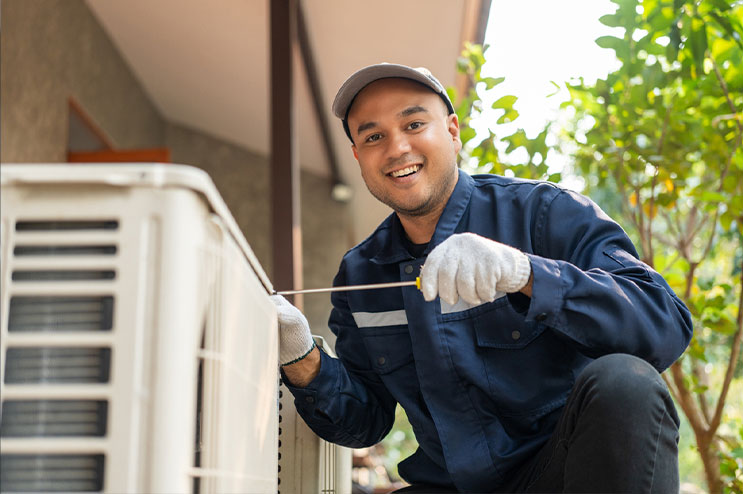Cost & Value: Repairing Your AC vs Upgrading to a New Unit

In the Baton Rouge heat, you may start running your air conditioner before summer even hits. If you have an older unit, you may worry about what to do if it starts malfunctioning when the temperatures hit the 90s. It’s a common homeowner dilemma: should you repair or replace your AC?
With your home’s comfort on the line, it’s not a decision you want to make lightly. This blog will walk you through everything to consider when your aging AC falters. We’ll consider cost and value to help you feel more equipped to make the right call for your home.
The Cost of Repairing Your AC
When your AC malfunctions, the immediate response is to call in a technician for repairs. Without an expert assessment, it can be hard to know what the problem is—and how much it will cost. Before calling, it’s helpful for homeowners to understand what factors into the total cost, and what makes your unit a good candidate for repair.
Factors That Determine Repair Costs
- Complexity of the Problem: Simple fixes like thermostat and filter replacements can be relatively inexpensive. More significant issues like broken compressors and refrigerant leaks can be costly.
- Cost of Replacement Parts: The cost of parts and materials can vary widely. High-quality, brand-specific parts typically come at a premium. The price can also fluctuate based on the availability of parts.
- Labor Charges: Labor costs depend on the complexity of the job and the time required to complete it. Repairs that need more specialized knowledge or take longer to fix will generally be more expensive.
- Warranty and Service Plans: If your AC unit is still under warranty, some or all of the repair costs may be covered. Having a service plan can also influence costs, as some plans include discounts on repairs.
What to Consider Before Repairing Your AC
- Age of the Unit: If your AC is relatively young, with years of service life ahead, repairing might be the most cost-effective option.
- Frequency of Repairs: Consider how often your unit has needed repairs. Frequent breakdowns are a sign that your AC is on its last legs, and continual repairs can be more expensive in the long run.
- Performance Impact: Assess how well your AC functions after repairs. If the fixes only offer temporary relief or if it struggles to maintain optimal performance, it might be time to consider a new unit.
The Value of Upgrading to a New AC
No homeowner wants to commit to a new AC prematurely. If you’ve determined that your AC is beyond repair, though, it can be an opportunity for a major upgrade. With so many systems to choose from, homeowners have more freedom than ever to customize their home comfort.
Advantages of Newer AC Units
- Improved Energy Efficiency: Modern air conditioners with higher SEER ratings consume less energy while providing better cooling. The more efficient the system, the more you can save on energy costs.
- Enhanced Comfort and Air Quality: Upgraded features like better humidity control and advanced filtration systems, not only keep your space cool but also reduce contaminants for cleaner indoor air.
- Warranty Coverage: Replacing your AC comes with the assurance of comprehensive warranty coverage. Manufacturers typically offer warranties that cover critical components, labor, and sometimes even extended service plans.
Factors Influencing the Decision to Upgrade
- Potential Long-Term Savings: While the initial cost of a new unit may seem daunting, consider the long-term savings in energy bills and reduced repair expenses. With fewer repairs, lower energy costs, and a longer lifespan compared to older models, the overall cost of ownership over time is significantly lower.
- Environmental Impact: Older AC models often use refrigerants that are harmful to the ozone layer and contribute to global warming. New models are equipped with eco-friendly refrigerants, such as R-32 or R-410A, which have a lower global warming potential.
- Incentives and Rebates: Many governments and manufacturers offer incentives, rebates, or tax credits for purchasing energy-efficient air conditioning systems. Some utility companies also provide rebates to customers who install energy-efficient appliances, including air conditioning systems.
Making the Decision: Repair or Replace Your AC?
Consider the 50% Rule:
A useful guideline in making this decision is the 50% rule. If the cost of repairs approaches 50% of the value of your AC system, or if your unit is older than half of its expected lifespan, investing in a new system might be the wiser choice.
Assess Your Current Unit’s Efficiency and Performance:
Evaluate how well your current unit meets your needs. If your energy bills are high, or if your unit struggles to keep your home comfortable, upgrading could solve these issues and be more cost-effective in the long run.
Think Beyond the Repair:
If you decide to repair your AC, what does the road after look like? Are you likely to be calling for more repairs soon? Will your home stay comfortable through the summer? Consider what makes sense for your home now and in the long run.
The Repair & Replacement Pros Are Here to Help
No matter how small, air conditioner trouble can be stressful. Homeowners in the Baton Rouge area can stress a little less knowing UBA Heating & Cooling is here to help.
Our AC experts have seen it all and repaired it all. We operate on trust and transparency to provide you with the right information and tools to make decisions about your home’s comfort. If your system could benefit from a repair, we will fix it in no time. If a replacement is the best option, we will walk you through the entire process.
Dealing with a broken AC and not sure what to do? We’re here for you! Contact us online or call us anytime at (225) 314-6119

